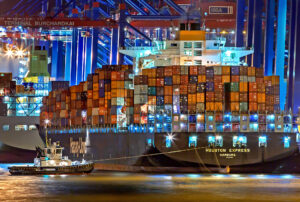Globalization stands for the interconnection of the world in terms of technology, goods, and other services. The world has been dependent on each other, since ancient times. However, the wave of globalization in actual terms hit in the 19th century. British colonial rule and trade imparted a major pathway to colonization in ancient times. Later, due to World War I, the Great Economic Depression, and World War II, the real impact and essence of it was lost.

When did Globalization began?
Globalization is an age-old concept. Since the days of civilization, Globalization has existed. Earlier, there were Silk trade routes between Europe, North Africa, Central Asia, South Asia, and Africa. Glass and other manufactured goods were traded for years. Spices have been an ancient part of exports.
Second wave of globalization

Ref: Wix.com
It was in the 1940s, the second wave of globalization hit the countries. The U.S. initiated negotiations on international platforms. The second wave of trade under proper rules, guidelines, and mutual consent of Nations began. It has been decades, the second wave of globalization is still up and running. There is evidence of periodic downfall, disputes, and issues.
However, in the broader frame globalization has become an inseparable entity of human existence. In other words, it’s undeniable that the economy of the world which was growing and falling in terms of separate nations earlier, is now working as one for the entire world. The world has become a single market. Dependency on imports and export has grown exceptionally high. The second wave looks unamicable. It’s definitely here to stay.
Understanding the causes of Globalization
Globalization is like a spreading pandemic in itself. It has a big list of causes, pros, and cons. Let’s begin with one of the major causes of globalization.
Technology

Is anyone in today’s scenario living deprived of technology? Let’s broaden our scope and begin with the third countries or the underdeveloped nations. Even the poorest of countries have made a mark in providing its citizens with necessary and basic technological assistance. To begin with, let’s talk about the internet, mobile phones, and laptops. Every corner of the world is blooming with this basic digital equipment. In such a case, it is absolutely undeniable to consider the widespread network formed via technology in the world as the leading portal of globalization.
Taking an example of international voice calls, that used to burn holes in pockets earlier has now become free via Voice over internet protocol usage. Most countries allow VIOP to operate as a method of connecting people living in different time zones. Majority of business tycoons operate internationally via mobile applications that work on internet such as WhatsApp, Skype, and Google duo.
Trade

Another essential thing to look after is the trades happening among countries. Most of the countries are still living in a slightly updated version of the barter system. With legally setup organizations and sealed rules and regulations, nations are following import-export laws. India, for example, is a leading producer of many crops, spices, and many other things – such as banana and turmeric, rarely produced in the US or other nations.
This acts as a major reason for export in exchange for money. To conclude this in simpler terms, there is a direct exchange of cash in between nations throughout the globe. Hence, the connection between global finance and economies. The fall in GDP in one nation links to a small or large impact on the economies of other nations. The same happens with the rise in the stock market. Globalization is not just about economies, it’s about a lifestyle, a way of living. It is now a means to survive, an addiction.
Rapid communication

It is unjust to forget about the times when letters and telegrams were the only means of communication for distant acquaintances. Can you imagine a world where a message would take days, maybe months to reach its Destination? Or maybe it will be lost in the path.
Rapid communication can be considered as a sub-part of the role of technology in globalization. Cell phones, internet, emails, and video calls have converted miles into minutes. It has also promoted international business. Skype, Zoom, etc. are major platforms to connect with various High profile MNCs. HealthCare is reaching even remote locations. Connectivity is blooming in terms of roadways, railways, and airways. The change leading to globalization is irreversible.
Transport of goods
The major evolution in globalization occurred as the discovery of containerization took place. Steel containers were manufactured, suitable for transport via every mode of transportation. This invention came out as a boon, the trade became easier with lowered cost. This method is still a leading way of trading goods and services.
Advancements in trading blocks
Trading leads to many ethical and moral issues initially, so it became important to set up basic rules. World trade organization (WTO) was set-up with an aim to improve the trading situation. Various trading blocks, zones, and free areas are formed as per the agreement between nations. Free trade is mutually supported in few countries whereas other kinds of the union formed among other countries.
These basic guidelines have made the process smoother with lesser disputes, hence pushing ahead the globalization. New Trade Theory has made some remarkable statements in the global markets. The importance of quality over price is finally given priority. It also overlooks upon the gain in economies over the scale and other kinds of specialization, that other nations may lack despite having an equal amount of product availability.
The rapid increase in global media
Not knowing about the latest news around the globe will pull back the concept of globalization. Therefore, the reach of media in every corner of the world is an important point to include in the rise of globalization. In seconds, the news about the terrorist attacks in the UK is spread to all other nations. The California fires are registered as a sad moment where all nations expressed their solidarity.
The spread of the pandemic, though reached some nations months later, media reported the awareness beforehand. The power of media is undeniable. It is a powerful source boosting up globalization at each step.
Capital and labor mobilization

There is an increase in capital movement between the countries. The labor and capital movement can be chipped as a part of the common chapter. There is a widespread movement of labor from developed to developing countries and vice-versa. This movement of labor is a reason for increased capital and GDP remittance.
The world bank has noted a significant increase in remittance since the mobilization took place. You find people from various countries settling or just traveling to another country to earn better capital. A share of this money is mostly sent back to their homeland, to their families. There we see capital mobility in full-fledged rotation.
Types of Globalization
1. Political Globalization
Let us begin by saying, politics is basically at the root of everything. From the construction of policies to the formation of laws and law regulating bodies. It’s practically impossible to assume globalization without a political essence in it. G20, managing global financial issues, a collaboration of 20 nations is a great example of political Globalization.
The policies for financial stability are formulated in a manner, that developing countries are profited by the help of developed countries, promoting the mutual growth of nations. There are multiple treaties signed among nations. The import-export of various goods, products, and services is also a major part handled via political interference. The major part of this is setting up the World Trade Organization (WTO) to ensure the smooth flow of trade among nations.
2. Economic Globalization
Economic globalization holds key importance. The whole concept of globalization works on one main principle, i.e. money. This category involves the exchange of products in turn of money or vice-versa. The countries that have rich growth of certain crops may sell it to another country which lacks the same. In turn, they receive money. This way both the countries are mutually benefitted. However, one major backdrop of this connectivity is seen in stock market crashes and financial depression. The fall in the rate of the dollar impacts other currencies too. Globalization isn’t a pact of immunity. It’s a pact of mutual connectivity.

3. Social and cultural Globalization
Observed widely in form of audio-visual aids, such as movies, series, songs, and other media. This type of Globalization focuses on blurring the gaps between various cultures and norms. The flow of cultural information is strongly flowing from developed to developing nations. In this case, the vice-versa scenario is rarely observed. This is a major drawback, the culture however is shared, is eroding in some parts while spreading like the flu in others. The mutuality of growth is considerably not equal. The developed nations have a stronger hold. The question remains, is the culture of developing nations not worth imbibing? The answer is clear, It definitely is. It’s just not highlighted as much as it should.
4. Technological Globalization
The easy access to basic technology to rich and poor, developed and developing have made it an important aspect of Globalization. It is now impossible to imagine connectivity as strong as we have today because of the Internet and digital devices. Social media is playing a key role in the interaction between the public from various countries. The connection is now more stronger and direct than ever. This single thing has made Globalization irreversible. It has made Globalization a home to nations. It’s here to stay. It’s here to grow.
5. More categories of Globalization
Other categories of Globalization include sharing of information, remaining ethical, maintaining climate and environmental balance, reducing other stresses among nations, and wildlife preservation at a global level.
Effects of Globalization
1. Variability in options/ Lower cost
China is one of the manufacturing hubs in the world. The cost of products arriving from China into various countries has lower prices. There is lower cost, higher competition and hence the public is benefitted with a great deal of variety. Various other countries are involved in the exchange of products, all leading to one conclusion- variability in option.
2. Improved availability
Many fruits and vegetables that were only available seasonally, and completely unavailable in certain other countries are now easily accessible throughout the year via the trade. The exchange of food items and year-round product availability is one of the major effects of Globalization.
3. Outsourcing
Who could have imagined that cost of technology would be reduced so much over the years? The major reason for this reduced cost is outsourcing. Globalization has paved a way to outsource the products in parts, making it easier and cost-effective for the public. Companies have call centers and manufacturing units where labor is affordable. MNCs are creating jobs globally by creating outsourcing of products.
Look closely at a mobile description next time, you will notice “assembled in US” label. That simply states the product was manufactured in parts i.e. outsourced somewhere else. The imported parts later were assembled in the US. Outsourcing also has a major disadvantage in creating joblessness in the home country. It leads to the expenditure of work to other nations while leaving self-nationempty of employment.

4. Labor
Labor is costly in developed nations. The migration of labor from developing countries can help developed countries to reduce costs. On the other hand, labor will be paid more than their home country. In this manner, it is a mutual benefit. Labor is required for various purposes. Industries, fruit picking, and cleaning jobs come under labor. Globalization has also been a major part of highlighting the problem with Women’s unpaid labor. Various reforms happened globally to change the scenario of women working extra hours, being unpaid, or unequally paid.
5. Tax avoidance
Many firms are taking advantage of the loopholes to reduce the tax. Tax is lower in certain countries. Shifting of companies to low-tax countries is an advantage. However, this puts then and their economies in a bad light. It’s equally bad as tax- thievery. There is a shift in sectors. Manufacturing hubs are changing, nuclear powers are trying to change, trade routes and pacts are modifying, this shift in the sector is also causing a question mark on the tax.
6. Increased inequality
As we keep focusing on numerous positive effects Globalization have on nations, this is one major negative effect that should also be considered. Due to globalization, small firms, local businesses are dying. There is increased inequality among the rich and poor. The gap is widening. The rich are employing poor labor, underpaying them, while improving their monetary status. There’s no check on moral wrongs that are happening via global linkage. The world has become a global village, connected with so many threads, some of which are getting thinner each day.
7. Environment
Let’s not forget what humans are doing to mother nature. Globalization is degrading the environment. The global leaders meet to discuss the environmental issues, finding solutions on a global level, which is a positive point of Globalization. However, it is Globalization itself that so vastly degraded the natural habitat of animals, the huge forests, and clean water bodies. Global warming is one of the major concerns today. The impact of multi-national companies on increasing Global warming is undeniable.

Advantages of Globalization
Few lines would never do justice to the positive role of Globalization in making economies strong. There are numerous advantages few of them are discussed below:
1. Global market
The movement of big currencies such as the dollar through international markets is a major example of expanding the global market. Multi-national companies are establishing foot in various locations generating capital from every country as well as imparting jobs. An increased rate of competition is leading to better quality and yield production. Globalization is acting as a motivational force to do better. The free trade agreements have allowed services to be expanded at a global level such as call centers, information units.
2. Cross-culture
Globalization is widely promoting cross-culture, especially among the elites. The cross-cultural benefits are not affordable to the poor. However, the rich from each nation interact on any opportunity they get. This leads to the sharing of ideas, beliefs, values, and even business proposals. One major example of cross-cultural Benefits is the popular food chain- McDonald’s. In America, it is a cheap and fast way of grabbing a bite, whereas, in countries like China and Russia, this outlet is an expensive privilege. It’s a way of experiencing different cultural cuisine.

3. Overseas trade
When globalization set foot properly in the 19th century, trade was the only way of connecting countries. With the lack of technology at that time, trade via silk routes and later in containers made the globalization possible. The availability of each product, from every nation to other just in a snap of a finger. Overseas trade has kept Globalization running on its feet and it always will. Organizations such as the World trade organization, look after the rules, and allow smooth flow.
4. Foreign investment
A major point of benefit for various developing countries like India is the movement of capital into their nation. Many developed nations invest their capital in other countries, with an aim to retrieve cheap labor and other materialistic goods, crop, or services. However, they also generate a huge amount of employment. This capital leads as a job creator, enhancing collaborative growth. An infinite boost in business is created. Developed countries gain good investment offers from developing nations making it beneficial for both.
5. Legal impact
Globalization has provided a lot of power to media. This in turn keeps the nations informed about any violation of rights, wrongdoings, or error of ways. The legal impact is strongly regulated by the nations, to keep their head held high. Media is ruthless when it comes to human rights and laws. Throughout the world a strong network keeps the public informed and up to date.
Disadvantages of Globalization
Among the countless benefits of Globalization, some disadvantages must not be ignored. Globalization is questionably believed to increase terrorism, job insecurities, capital flow, price fluctuations, and similar issues.
1. Job insecurities:
As we said above, that globalization is a leading cause of outsourcing, leading to job employment in other countries. However, it has a downturn, this fact is also eligible in creating fewer jobs in developed nations. There are job insecurities, as multinationals shift their business aims in other countries, leaving many unemployed. This can also be indulged as a factor behind increased criminal activities and terrorism.
Another negative outlook of this situation will be public disapproval, depression, and anger. Strong exploitation of labor safety standards has been noticed due to Globalization. This is due to the availability of cheap labor who are uneducated and unaware of their rights. The only situation presented to them is losing a job or losing their life. They choose their jobs over their life.
2. Fluctuations in cost
There is a notable sharp fluctuation and change in product and services costs. Countries like China produce cheap products with variety, this puts a lot of pressure on other nations to reduce their cost. The competition is extremely high. It is many times sabotaging the progress of a developed country, as the labor is extremely expensive there.
3. Cultural invasion
Due to Globalization, many countries are losing their essence, their culture. This phenomenon is widely named as Westernization. Due to this, in the global sphere, the diversity will slowly become a minute point. This cultural invasion also leads sometimes to the triggering of religious groups, causing disputes among minorities and majorities.

4. Fast-food chains
The widespread of the fast-food chains has lead to the deployment of agriculture. The essence of home-made food is getting lost in the cheap fast-food. The farmers are suffering this the most. The producers ask farmers to grow uniform crops. This is to improve processing. However, It is a leading cause of removal of agricultural diversity. The fast-food is also high in soda, sugar, and fat content. This leads to the spread of obesity and diabetes on a large scale.
Conclusion
It is practically, impossible to imagine a world without connectivity. Globalization has become a dire need of time. It is an irreversible change that is rooted in our lifestyles. A business can bloom by becoming an imbedded chip in the pool of connectivity the world is offering. This is ‘The Chance’ for every business leader or industry to walk along with globalization. Think about the future, shake hands with globalization, it’s time to make a move. It’s time to Globalize and transform the future.
Also Read:
- The Indian Edtech Industry: Trends To Watch In Future
- Factors Affecting The Attractiveness Of Medical Tourism
- What Is Brexit? How It’s Impacting Businesses And The World Trade?
- Reimagining Healthcare In India: Trends And Tomorrow’s Possibilities
- Why It Makes Sense To Properly Register Your Business In Thailand




